Take Me to the "River": Former AADL staffer Shutta Crum discusses her latest book of poetry and her path from librarian to author

Shutta Crum worked for 24 years surrounded by books.
Now the former librarian at Ann Arbor District Library is adding to the stacks she used to stock, writing both children’s books and poetry.
When asked how librarianship connects with writing, Crum talked about how the job motivated her to become an author. “I knew I wanted a book of mine on those library shelves,” she said.
Crum's latest collection of poems, The Way to the River, navigates real and metaphorical waters, from looking for osprey where “Rainwater pelts river water” to recalling tumultuous moments when the poet asks someone terrorizing her, “what door you jimmied / to escape and machete through my memory.” The ever-present passage of time surges through these lines as Crum looks back and ahead.
The Way to the River begins with the reflection “Why Poetry,” which shares a preface by Crum and her poems, “Aboutness” and “How Poetry Reframes the Moment.” Her depiction of poetry tells us, “Poems are mini stories, fleeting images, quick gestures of recognition and a lilt of music for the soul,” a statement that also aptly describes her poetry. The following poems in the book form the “colorful collage” that Crum sees in poetry.
The Return of AADL's Fifth Avenue Press: Local authors celebrate the release of their books on May 22

The Ann Arbor District Library's Fifth Avenue Press, which started in 2017, helps local authors produce a print-ready book at no cost—from copyediting to cover design—and the writers retain all rights. In return, the library gets to distribute ebooks to its patrons without paying royalties, but authors can sell their books—print, digital, or audio—in whatever ways they choose and keep all the proceeds.
Fifth Avenue launches its fourth round of books on Sunday, May 22, with a book-release celebration from 1-3 pm in the lobby of AADL's downtown location, featuring author readings from many of the imprint's 10 new titles.
Click the book titles below to jump to interviews with the authors and illustrators:
Answer Me This: U-M lecturer Phil Christman explains it all in his new essay collection, “How to Be Normal”

Phil Christman takes on the problem of How to Be Normal in his new essay collection by interrogating broad categories of life. Like his earlier book, Midwest Futures, the essays are wide-ranging. For How to Be Normal, Christman tackles topics including “How to Be a Man,” “How to Be Religious,” and “How to Care.” Christman takes unexpected turns by bringing in references including Star Wars, Mark Fisher, and Marilynne Robinson.
One of Christman’s essays, “How to Be Cultured (I): Bad Movies,” begins with a reflection on watching such films as a shared hobby his father. He analyzes Mystery Science Theater 3000, failings of adults seen through a child’s eyes, Ava DuVernay’s adaptation of A Wrinkle in Time, and Raiders of the Lost Ark, among others. The issues in the films can be generalized, as Christman writes:
Time is punctuated by motherhood, the pandemic, and a family rupture in poet Carmen Bugan’s new collection, "Time Being"

Carmen Bugan’s new poetry collection, Time Being, shows how the coronavirus has meant many different things to many people and also that it put us into our own bubbles. Bugan’s isolation includes her children, garden, home in New York, connection to Michigan, and eventual divorce. Her poems chronicle the months of isolation, motherhood, the excessive losses to the virus, and the ways that the pandemic, despite upending everything, was nevertheless not the only thing happening in 2020 and 2021.
Bugan turns her outlook inward in Time Being. Part I serves as foreshadowing with the poem “Water ways” when the outcome of making footsteps on sand is that “the ocean erases them impatiently” as a parallel to the later repetitive, near-daily baking during the pandemic. In Part II when the pandemic strikes, the poems question, “But who could have imagined our / new lives six months ago?” and “Who would have known we’d be staying home / Nearly a year, the house growing around us / Like a shell, shutting out the life we knew?” The situation could not have been anticipated, as “Water ways” alludes:
Patti F. Smith taps into the stories of brewpubs, brewers, and their beers in her new book, "Michigan Beer: A Heady History"
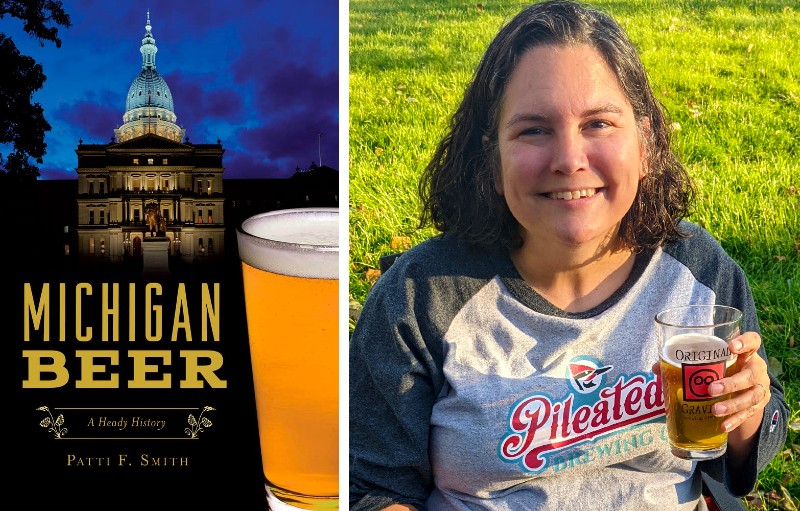
Patti F. Smith's introduction in her new book, Michigan Beer: A Heady History, may activate your thirst to take a seat at one of the state's many current establishments:
Like the waves that crash in the magnificent Great Lakes that surround Michigan, beer and brewing has constantly moved and evolved in the state. […] Come along on a trip through the history of Michigan’s brewers and beer as we explore, region by region, the history of brewing in our great state.
But Michigan Beer reports on mainly pre-World War II businesses and their beverages. Smith highlights the “first wave of brewers” who came to the U.S. from countries like Germany and Prussia. She also describes the “second wave” who endured or sprung up after Prohibition and also struggled during WWII. The “new wave” gets a dedicated chapter at the end of the book regarding breweries in the 1980s and onward.
Michigan Beer is organized by regions of the state: the Upper Peninsula, Western Michigan, Mid-Michigan, Eastern Michigan, and Southeast Lower Michigan, plus the “new wave” not divvied up by location. Each chapter spotlights numerous corners of the state from Copper County and Escanaba to Grand Rapids and Detroit, with many more cities showcased. Readers can look up their hometown, college town, or favorite vacation spot and see what breweries were once pouring there.
Angeline Boulley’s YA Novel, "Firekeeper’s Daughter," Follows a Native Teen Who Discovers Intrigue and Betrayal in Her Upper Peninsula Community
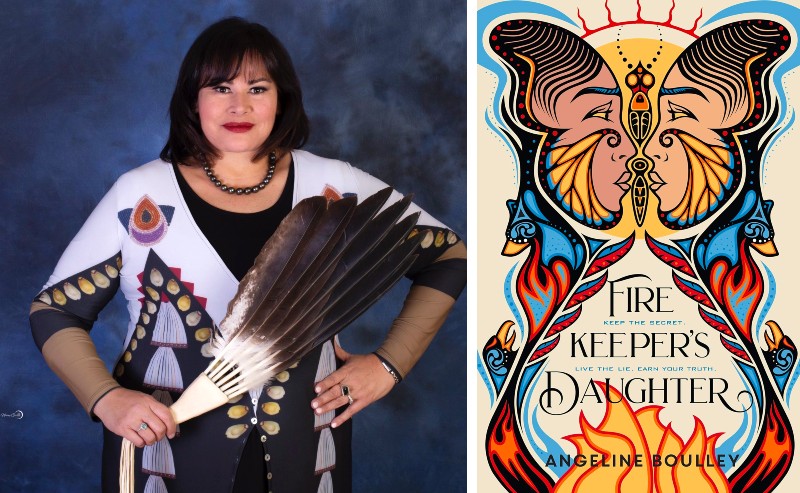
When author Angeline Boulley wrote her new young adult novel, Firekeeper’s Daughter, she had a goal for the thriller. She writes about her main character, Daunis Fontaine, in her Author’s Note:
Growing up, none of the books I’d read featured a Native protagonist. With Daunis, I wanted to give Native teens a hero who looks like them, whose greatest strength is her Ojibwe culture and community.
Daunis fills that role with resilience as a narrator, woman, community member, and confidential informant.
Ann Arbor District Library will host Boulley for an author event on Wednesday, April 6, at 7 p.m. at the Downtown Library.
In Boulley’s novel, Daunis experiences multiple tragedies in her Ojibwe community in a short amount of time. She then discovers that there is a related, ongoing federal investigation about a drug ring. Firekeeper’s Daughter tracks the steps that Daunis takes to unearth what is going on in her hometown of Sault Ste. Marie in the eastern Upper Peninsula of Michigan. At the same time, Daunis is entering her first year of college and grieving the deaths of loved ones.
As Daunis becomes embedded in the investigation, she must learn how to be a confidential informant and also reckon with the pressures and dangers of her role. FBI agent Ron Johnson tells her:
“If you as an agent of the law, obtain evidence illegally, then the information is inadmissible in court under the Fourth Amendment. It’s called fruit of the poisonous tree. It’s better for you to volunteer information and let us ask for clarification.”
Early on in the novel, she begins walking a tightrope of her role as a CI and relationships with her family and friends. The situation blurs as Daunis pretends to be dating one of the agents, Jamie Johnson, who has also joined the local hockey team to advance his undercover ruse.
Ojibwe teachings guide her actions, and Auntie, without knowing what Daunis is involved with, also advises her that:
“You need to be careful, Daunis, when you’re asking about the old ways.” She looks at me the way Seeney Nimkee does sometimes at the Elder Center. “There’s a saying about bad medicine: ‘Know and understand your brother but do not seek him.’”
Daunis continues exposing secrets and also learns about the further tragedy that, “Not everyone gets justice. Least of all Nish Kwewag.” As Boulley also highlights in her Author’s Note, Native women experience high rates of violence.
Prior to her talk at AADL, I interviewed Boulley about her novel and plans.
Jennifer Huang reconceptualizes home in their new poetry collection, "Return Flight"
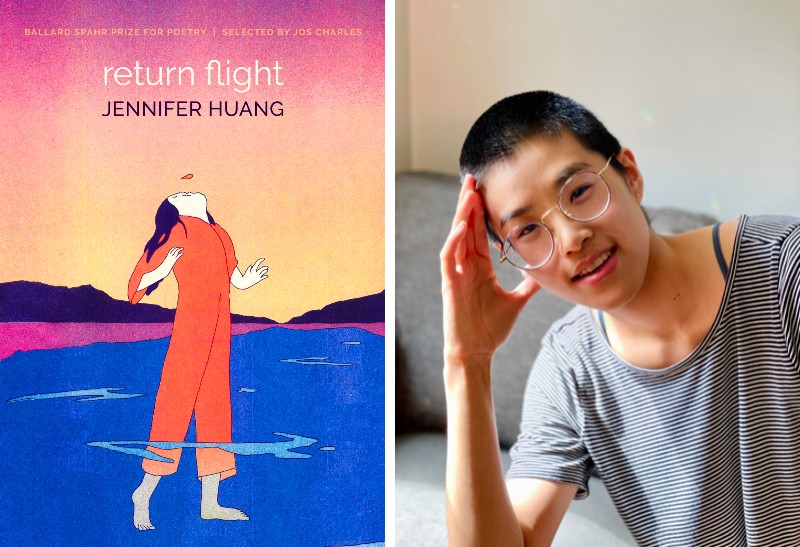
Poems in Jennifer Huang’s Return Flight map the ways that a person can depart and return to themself, though sometimes that self is no longer the same. Huang holds an MFA in poetry from the University of Michigan Helen Zell Writers’ Program, and their collection won the Ballard Spahr Prize for Poetry in 2021 judged by Jos Charles.
Some of Huang’s lines suggest disillusionment, given that “This is not what I imagined.” Other lines show a separation from oneself and the effect of external influence when, “The distance between me and I grew / So you could love me as you’ve / always imagined.”
Return Flight plays with desire and how to get what is wanted and what is the cost.
Another poem, “Departure,” describes a meal at which “We would / choke down our food to get seconds though there was always plenty,” and when faced with delicacies, the father would "tell me, Chew slowly and feel what you are eating.” That advice to process slowly and notice could be extrapolated to a number of situations in these poems.
The search for self continues even as that evolves in Return Flight. The poem “How to Love a Rock” teaches us, “How you / worry now, let it go.” As the self is reclaimed, uncertainty remains when, “Unborrowed from rocks and salt and dirt and root, where I go from / here, I don’t know.” It could be anywhere, which fits with what Huang writes in the acknowledgments: “This collection is, in part, a search for home—and the realization that home is not a destination but a journey.”
Huang was a resident of Michigan and now spends their time in Michigan, Maryland, and other places. I interviewed them about Return Flight.
When the Draft Is Done: Author and U-M professor Peter Ho Davies on "The Art of Revision"
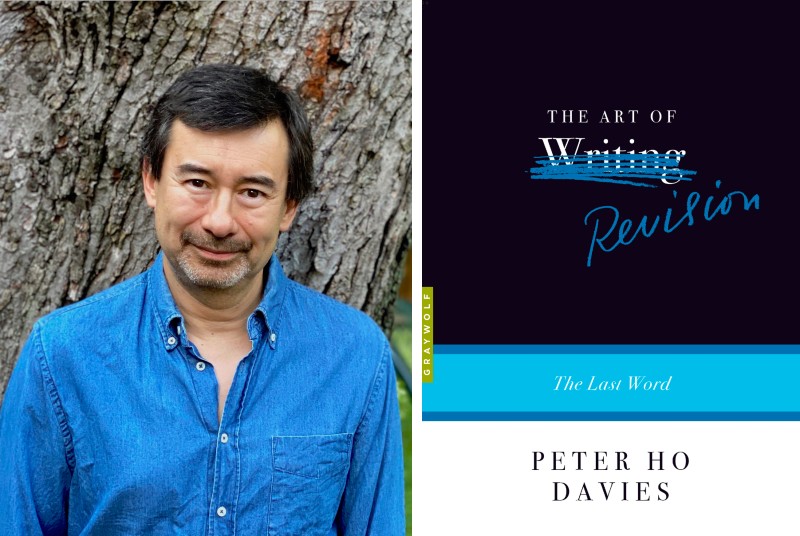
How do authors go about the revision process?
In novelist and U-M professor Peter Ho Davies‘ new nonfiction book, The Art of Revision: The Last Word, he observes, "As a teacher of writing, I’ve often been struck by the sense that revision is an overlooked, underaddressed, even invisible aspect of our work: the ‘elephant in the workshop,’ if you will."
Davies goes on to discuss approaches to revision, the need for it, and a number of examples.
Theories of writing, such as “write what you know,” do not lend themselves to revision well, Davies says, because writing instead serves as an act of discovery. The medium of typewriter or word processor changes the process from painstaking typing to countless drafts as new versions are saved over the previous one on a hard drive, useful in some ways and less deliberate in others. An author’s questions become, “What’s changed?” and “How do I know when a story is done?”
Davies proposes that "a draft might be seen as an experiment designed to test a hypothesis.” This perspective on writing reveals to the writer what they are thinking and then also guides revision. That hypothesis may or may not prove right as the writer proceeds. Davies says, "You make a choice, pursue it, discover it was wrong, and … go back to the previous draft. Is this wasted time, wasted endeavor? I’d rather call it a successful experiment."
In "Alien Miss," Ann Arbor poet Carlina Duan explores the multiple identities Chinese Americans inhabit
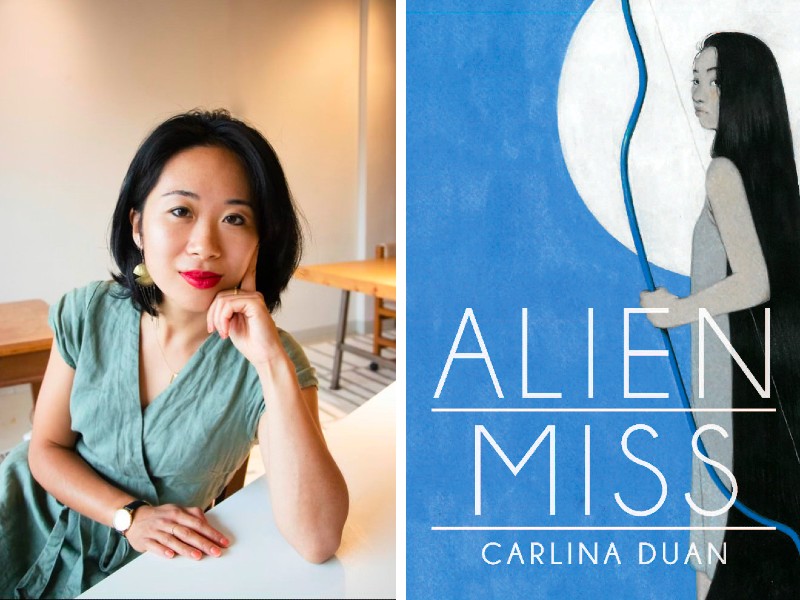
Carlina Duan’s new poetry collection, Alien Miss, delves into the history and experiences of Chinese people, particularly how immigrants and their families face or have faced marginalization in the United States and also how they find success. Poems go back to the Chinese Exclusion Act barring entry to the U.S. for Chinese laborers and are later contrasted by cozy family meals while growing up in America.
The contrast stands out, as one line reads, “I pledge allegiance. to history, who eats me.”
These disparities between experiences pepper the poems. Family with its relationships and histories figures strongly into the experience, as in the poem “Love Potion”:
Welcome to "Paradise": Jennifer Metsker's new book of poems explores a bipolar mind
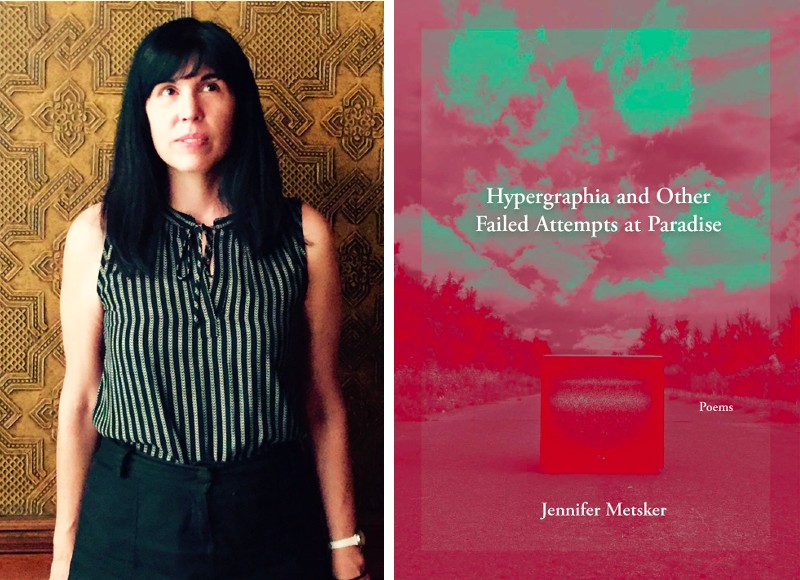
In Hypergraphia and Other Failed Attempts at Paradise, Jennifer Metsker’s poems articulate a bipolar person's thoughts as they unravel. The poems show the mind making associations outside of rules as obsessions, fears, and beliefs take hold.
One of the poems, “Beta Waves Are Not Part of the Ocean and We Prefer the Ocean,” brings us to a psychiatric ward. People living there take on feline qualities and have cleaning duties, noting, “There’s no escape / from being a tidy cat.”
Amidst the mind’s chaotic adventures, the outlook remains bleak because:


































